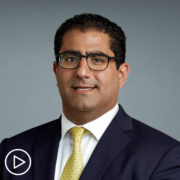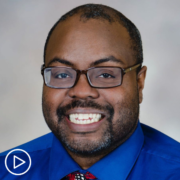Dr. Eugene Manley: Why Is It Important for You to Empower Patients?
Dr. Eugene Manley: Why Is It Important for You to Empower Patients? from Patient Empowerment Network on Vimeo.
Drawing from his experiences interacting with patients, survivors, and caregivers, Dr. Eugene Manley emphasizes the significance of providers meeting patients “where they are” emotionally, mentally, and logistically.
See More from Empowering Providers to Empower Patients (EPEP)
Related Resources:

|

Dr. Samuel Cykert: Why Is It Important for You to Empower Patients? |

Dr. Charlotte Gamble: Why Is It Important for You to Empower Patients? |
Transcript:
Dr. Eugene Manley:
So, you know, I talk to patients here and there and I’ve talked to survivors and I talk to caregivers of families, of people that have had family members that have, unfortunately, passed away from lung cancer. And the key thing they always say is they, you have to meet people one where they are and not where you want them to be.
So that means you have to really listen to what they need and say break down the jargon, be comfortable, ask, answering the questions because the patients don’t know any of this stuff when they go in. And pretty much when you are hit with a cancer diagnosis, there are 10 other thoughts going through your mind beyond just the cancer.
Like, how am I going to pay for rent, food? Can I tell my family? Do I…will I lose my job? Will I lose my insurance? There are many, many other thoughts, and then it’s like, well, how much time do I have left? And then that’s where you even start thinking about, okay, what are my options? So you have to really walk with them.
I think a key part in this that we often don’t have are those nurse navigators are really, really key in this stage is they help really translate and walk the patient from dealing with the clinician into all the stuff that’s going to be going downstream. So just really, really critical to listen to the patients and try to have that ear and really think what’s in their best interest and not dismiss them.










